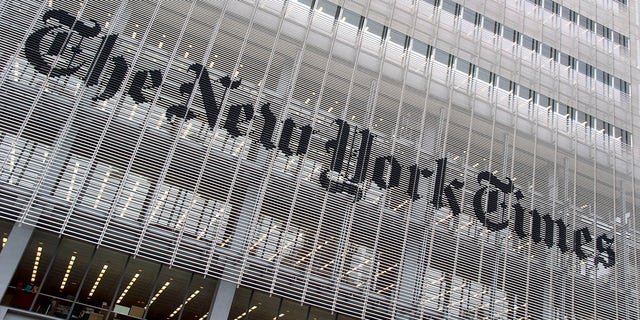Contributor Joe Concha to Fox News describes how the media has changed the definition of the term “recession” to suit the needs of the White House.
NEW Fox News articles can now be heard on audio! Because it insists that “strange vibrations in the economy” are creating the conditions for a recession while both economists and consumers agree that the recession has already begun, a guest essay in the New York Times is drawing criticism.
“The economy is feeling strangely. That strangeness has tangible implications, “Kyla Scanlon, a writer, posted on Thursday.
Scanlon asserted that the U.S. economy is less concerned with the truth and more concerned with interpretations of the truth, such as how consumers respond to reports of economic collapse.
“We enter perilous area,” she argued, “when policy is more focused on indicators that may not accurately reflect reality, and not on the foolish and messy people that the policy is designed to benefit.”

The home of the New York Times. (iStock)
“Recession has not yet occurred. We are currently going through a vibe-cession, a time when individuals have lower expectations based on both present-day concerns and previous experiences.”
Scanlon also attributed the negative expectations that American consumers have about the economy to “noise,” stating that the economy is a reflection of what people do and that when too much negative energy dominates the prevailing narrative, it can cause people to “expect the worse.”
Scanlon argued that even while there are signs of a recession, it has not yet occurred and that people are only anticipating the worst. He wrote: “People often get what they expect, and right now, with the statistics getting worse, many people’s expectations have coalesced to expect a recession. And those hopes can very well result in one.”

On January 13, 2022, shelves of paper towels and toilet paper are empty in a store in Miami Beach, Florida. (Image courtesy of CHANDAN KHANNA/AFP) (Image courtesy of CHANDAN KHANNA/AFP on Getty Images) Getty Images (CHANDAN KHANNA/AFP)
The article continues by citing a bewildering array of economic woes indicated by crucial data, such as the second consecutive decline in gross domestic product (GDP), an increase in unemployment claims, and a 9.1 percent increase in the consumer price index, and suggests that these grim numbers are to blame for the “bad vibes” people are experiencing.
Economic indicators, according to Scanlon, “are a Jackson Pollock painting of data points and trends.” If we are not attentive, false assumptions—what John Maynard Keynes referred to as “animal spirits” or “noise,” according to economist Fischer Black—will fill that gap and come true.
The topic then switched to consumer confidence significantly wounded over several months, the housing market, and business price gouging, all of which were seen to be contributing contributors to the unfavorable sentiment coming from consumers.
“There is an issue. And if they don’t change, we’ll have more to be concerned about than just bad vibes “Warning from Scanlon
Twitter users criticized the statements made in the post, and Stephen Miller, a contributing editor at The Spectator, tweeted screenshots of the piece with the following message: “This recession is a result of your negative energy, guy. Why are you unable to just let the economy go and be cool?”
Others who commented on Miller’s post expressed their own financial difficulties, detailing how much inflation has increased their shopping expenses, and disputed the claim that American customers are to blame.
Fox News’ Taylor Penley is a production assistant.













